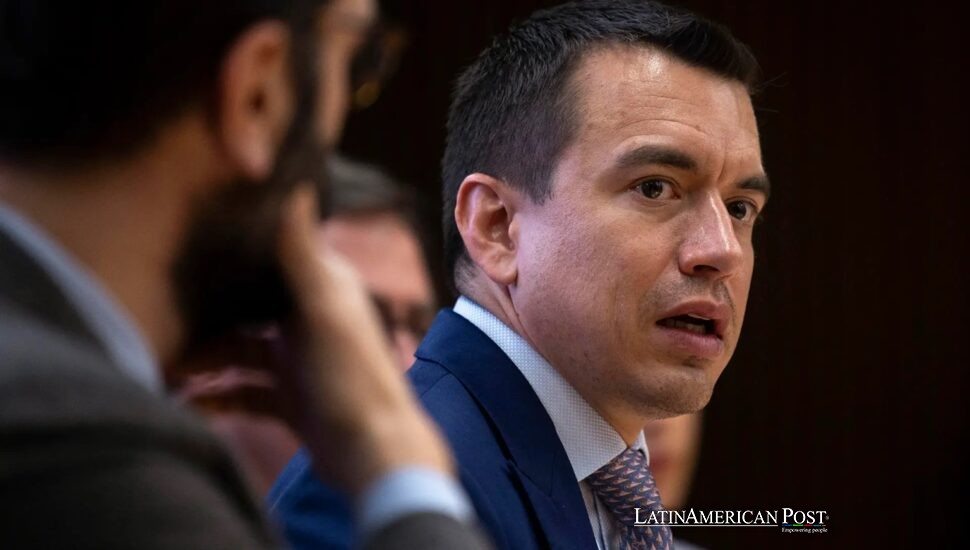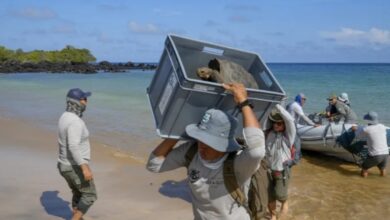Ecuador Starts Final Week In Election Campaign With Allegations And Surprises

Poised on the brink of a tense national decision, Ecuador steps into its final week of campaigning. Voters see President Daniel Noboa and Luisa González as frontrunners in a crowded field, yet other contenders crisscross cities and villages, hoping for last-minute momentum and challenging the status quo.
Bitter Rivalries And Allegations
Ecuador’s upcoming election has ignited rivalries that shape public debate. President Daniel Noboa, seeking re-election under his Acción Democrática Nacional (ADN) banner, tours rural provinces like Los Ríos, weaving through small towns with caravans of supporters. He projects an image of steady governance and quick solutions to security and economic woes. He hammers home a single message along the way: trust his administration for stability, especially in a country battered by years of political upheaval.
Yet controversy follows him. He has repeatedly delegated the presidency to Cynthia Gellibert instead of Vice President Verónica Abad whenever he leaves the capital to campaign. Critics, including Abad herself, believe this circumvents the constitutional order. Abad labels Noboa’s decrees as a “coup” because they ignore her authority. Her anger led to a request for the Organization of American States (OAS) to step in. She claims the president broke standard procedures. But Noboa points to urgent political needs. The president sees Abad as an opponent who tries to harm the government before a key election.
The conflict now affects public discussions or policy plans. A group in purple ADN shirts listens to Noboa’s direct speeches at farms. His lawyers wait for the Constitutional Court to decide about Abad’s claim of unlawful actions. This uncertainty complicates his campaign. He cannot fully celebrate campaign gains until the highest judicial body clarifies whether his practice of appointing a “vice president in charge” offends the Constitution. Some fear the court’s ruling could destabilize the race if it arrives in the heated final days. Others argue that voters are more concerned about everyday realities—violent crime, inflation, and job scarcity—than obscure legal disputes in Quito.
Noboa’s critics exploit this friction to paint him as opportunistic, willing to bend rules for personal advantage. Critics say that Noboa has split the executive branch instead of creating unity. This adds to beliefs about Ecuador’s weak institutions. His opponents point out that his disregard for constitutional rules during campaigns raises doubts about his fitness for another term. A group of Noboa supporters responds that Abad blocks good governance or refuses to work with the administration’s plans. But these conflicts take focus away from urgent problems like rising murders along with job losses.
Polls now show Noboa leads Luisa González by a small margin. González maintains close ties to former President Rafael Correa’s policies. The two candidates stay ahead of the other contenders. Talk spreads about one candidate winning outright without needing a second vote. Different surveys predict varied outcomes—from a tight race to a surprise victory in the first round. The people of Ecuador now wait to see what the election results will bring.
Conflict Between Noboa And Abad
Observers contend that Noboa’s repeated delegation of presidential functions to an unelected subordinate is the height of impropriety. The Constitution, they note, designates the vice president as the natural successor or deputy. Ignoring that line of succession, even temporarily, smacks of undermining popular will. Abad, who claims a voter mandate to step in whenever Noboa is away, calls the move an assault on democracy. She cites legal clauses specifying that the vice president shall substitute for the president whenever the latter is incapacitated or absent. To her, traveling on the campaign trail undeniably qualifies as an absence.
Amid the swirling accusations, Noboa’s supporters argue that Abad’s loyalty is so questionable that trusting her with state secrets or legislative oversight could sabotage the administration’s agenda. They pointed out earlier public spats in which she labeled certain presidential decrees “dictatorial.” In their view, even fleetingly, a fractious vice president occupying the top post might enact contradictory policies or hamper national security decisions. So they consider the Cynthia Gellibert appointment a practical measure, not a constitutional violation.
At the same time, political analysts suggest quarrels are more about image and control than abiding by legal frameworks. The president sees no option to grant authority to a competitor who challenges his re-election bid. Each day, Abad lacks access to her stand-in position, which adds weight to her claims about Noboa’s autocratic rule. She picked bold words to label these decrees as a “coup” – a term that carries deep meaning in Latin American politics. Her jump from procedure problems to accusations of a takeover seems extreme but connects with voters who feel tired of power conflicts.
The political clash caught the eye of outside watchers. Teams from the European Union or the OAS stay ready to act. A close review of these internal disputes could affect the election’s credibility. Reports after the vote may influence how other nations view the next government’s right to rule. If observers point out that the Constitution breaks or forces control, foreign nations could step up the pressure, especially with a close vote count.
Opposition On the Campaign Trail
As Noboa grapples with internal conflicts, other candidates seize the moment. Luisa González of the Revolución Ciudadana party storms the bustling streets of Guayaquil, specifically areas like the Guasmo, rallying supporters with promises to restore the social programs championed by Rafael Correa. She depicts Noboa as an elite member who shares the old guard’s market-focused policies despite his modern image. Yet the stigma of Correa’s mixed legacy affects her campaign – some praise him while others condemn his alleged misdeeds. González talks about bringing people together and rebuilding social programs. She connects with local news outlets or joins large gatherings to express care for poor neighborhoods affected by violence.
Further north, a separate cluster of aspirants angle for breakthroughs. Andrea González Náder from the Partido Sociedad Patriótica travels to Riobamba, weaving through markets to greet vendors. She stepped into a more prominent role after the assassination of journalist-politician Fernando Villavicencio upended the prior campaign. Now, she positions herself as a voice against political violence, urging reforms to protect women in politics. The ex-minister Henry Cucalón presents a plan for regulated mining. He claims proper controls would let minerals assist the state without causing illegal work or damage to nature. Although less visible than Noboa or González, these candidates show a search for votes as each tries to stand out with different policies.
Leonidas Iza speaks for indigenous groups and enters the race. He went to Otavalo, a city in the Andes known for native traditions, to promise protection of community needs that officials often ignore. His message about fair treatment, land ownership, and farm methods appeals to country voters but faces competition from larger political groups. Some experts point out that native groups changed national choices before, even removed leaders, or made deals when people felt upset. Their capacity to unify pockets of the electorate might matter if no top candidate secures enough votes for a first-round outright victory.
Casting The Final Votes
The election date of February 9 calls more than 13.7 million Ecuadorians to select the next president along with the vice president, 151 members of the National Assembly, and five representatives of the Andean Parliament. If no candidate surpasses 50% of the vote or achieves 40% with a 10-point lead, the top two will meet in a second-round runoff on April 13. That dynamic sets a potential showdown between Noboa and González—assuming one doesn’t unexpectedly clear that 40% threshold with enough margin to win outright.
Already, conflicting polls amplify uncertainty. Some show Noboa or González edging near the 40% line, though the margin of error raises doubts about a guaranteed first-round knockout. Others suggest that while they each poll strongly, a runoff is inevitable. The turnout will be high because electoral participation is mandatory for adult citizens in Ecuador. Voters must select between different styles of governing along with different personalities.
The campaign enters its last phase with intensity. Noboa drives through villages to explain his ideas for protection and changes to Ecuador despite problems with Abad. González speaks to people who want Correa’s aid back or visits neighborhoods with many workers. A few other candidates present their views in debates, radio shows, or local visits to gain more support.
The press discusses risks from other countries, online attempts at deception, and vote-buying that may change election outcomes. Officials plan to observe the process during this tense period. Some fear political violence could reemerge, recalling tragedies like the assassination of Villavicencio that once shook the public. Police are said to step up patrolling at campaign events, mindful of the potential for confrontations or infiltration by criminal gangs.
Many Ecuadorians expect the election to create more stability. The citizens remember how their nation went through numerous legislative standoffs as well as a series of short-term presidents in recent times. The impact of rising crime and pandemic problems made these changes harder. A clear result that gives the power to lead appeals to people even though doubts exist about how a winner could unite citizens with different views. Observers note that whichever leader emerges must handle immediate crises—from rampant narcotraffic to economic stagnation—while bridging internal rifts that cut across party lines.
The clock ticks down in Ecuador as disputes about presidential duties cast shadows on its future. A pivotal time faces the nation, where the next leader must tackle complex obstacles. The winner must handle personal conflicts or legal issues next to public distrust of politicians. A clear-cut win could settle matters for now, but success depends on two factors. The next leader must build alliances in Congress and convince citizens about respect for the Constitution. It all hinges on the results of the upcoming vote as millions file into polling stations across Andean highlands, lush Amazonian provinces, and coastal cities battered by cyclical storms.
Also Read: Bolivia’s Judicial Elections in Peril Amid Legal Disputes
Ecuador’s election saga thus remains open-ended. The final days could bring sudden changes, such as late endorsements, court decisions that alter discussions, or scandals that change poll forecasts. The voters feel anxious as they want to avoid past mistakes and broken promises. A verdict approaches on whether Daniel Noboa keeps power, Luisa González leads a Correa-style return, or an unexpected candidate pulls off a win. By February 9, the nation will decide which path to follow, forging either continuity, populist revival, or an entirely new direction.




